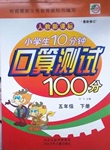题目内容
instruct,seek,guarantee,participate,polish,amuse,perform,behave
1.Who you associate with influences your thoughts, actions and __________.
2.A complex engine has many separate components, each __________ a different function.
3.Some students might spend most of their holiday time on __________, and thus leave their study neglected.
4.The children loved sliding round the newly __________ floor.
5.The reason why he __________ in this test is to go abroad to study.
6.The Chinese government took immediate action to __________ the overseas Chinese safety.
7.We were __________ that we should finish the work as soon as possible.
8.They settled in Paris, and __________ an interesting project on which to work.
练习册系列答案
 小学生10分钟口算测试100分系列答案
小学生10分钟口算测试100分系列答案
相关题目


 r such ____ games."
r such ____ games."